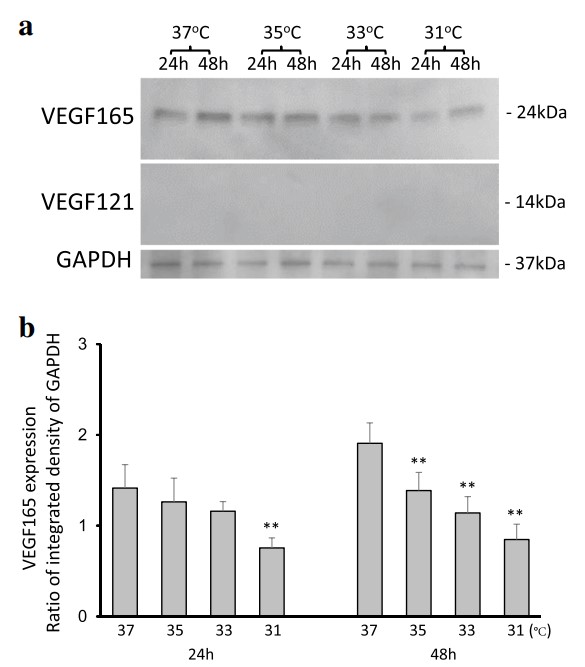Creative Biolabs offers Vascular Endothelial Growth Factor (VEGF) secretion assay services to actively support research on Age-Related Macular Degeneration (AMD) based on induced Pluripotent Stem Cells (iPSCs). By accurately measuring the secretion levels of VEGF, we assist our clients in developing more targeted and effective AMD therapeutic drugs.
VEGF plays a crucial role in promoting angiogenesis and repairing damaged tissues in the human body, ensuring the normal function of the vascular system. However, in the wet form of AMD, VEGF's role reveals its darker side. In this condition, VEGF's overactivity not only promotes the growth of abnormal blood vessels but also these newly formed vessels are exceptionally fragile, prone to rupture and leakage, leading to subretinal fluid accumulation and bleeding. As these lesions accumulate, the retinal structure is damaged, ultimately leading to significant vision loss and affecting patients' quality of life. Currently, anti-VEGF therapeutic strategies being tested have proven to be highly effective for wet AMD.
Through iPSC technology, by reprogramming and subsequent induction differentiation, we transform cells derived from AMD patients into retinal cells that closely mimic the pathological state of the human body. By performing VEGF secretion assays on these cells using ELISA (Enzyme-Linked Immunosorbent Assay), Western blot, or other suitable molecular biology techniques, we can assist our clients in screening the most effective anti-VEGF therapeutic drugs, accelerating the discovery and development of new treatments.
1. Detailed Experimental Reports and Data Analysis
Clients will receive detailed experimental reports including quantitative results of VEGF secretion levels, along with data analysis, experimental conditions, methods, and techniques used. This data is significant for understanding how drugs affect VEGF expression.
2. Drug Screening and Optimization Strategies
Based on the results of the VEGF secretion assay, clients can identify candidate drugs that effectively inhibit or regulate VEGF expression. This helps narrow down the research scope, focusing on the most promising drugs, thereby accelerating the drug development process and optimizing treatment strategies.
Q1: What kind of samples do clients need to provide?
A2: Clients should provide samples of candidate drugs to be tested and related information about the drugs, such as the diluent, and properties of the drug. Additionally, if there are specific concentration ranges or treatment conditions (such as treatment time, temperature, etc.) that clients believe might be most effective, these should also be provided to facilitate the VEGF secretion assay by our technicians.
Q2: How do you ensure the accuracy and reliability of experimental data?
A2: Our laboratories employ strict standard operating procedures and quality control measures to ensure the accuracy and repeatability of experiments. Moreover, all data analyses are conducted by experienced scientists using advanced statistical software to guarantee the accuracy and reliability of data analysis.
The reduction of retinal temperature following vitrectomy may help inhibit the progression of wet AMD. By culturing RPE cells at different temperatures, the expression of VEGF-A is found to decrease with the lowering of temperature, suggesting that RPE cells under low-temperature culture conditions could create an anti-angiogenic environment.
 Fig.1 Western blot analysis of VEGF165 and VEGF121.1
Fig.1 Western blot analysis of VEGF165 and VEGF121.1
Creative Biolabs, adhering to the spirit of scientific innovation, focuses on providing cutting-edge VEGF secretion assay services. Our professional team is equipped with advanced technology and extensive experience, committed to supporting your needs in the anti-VEGF drug development field. If you are at a critical stage of seeking effective suppression of VEGF to pave new paths for treating AMD, do not hesitate to contact us.
Reference
For Research Use Only. Not For Clinical Use.